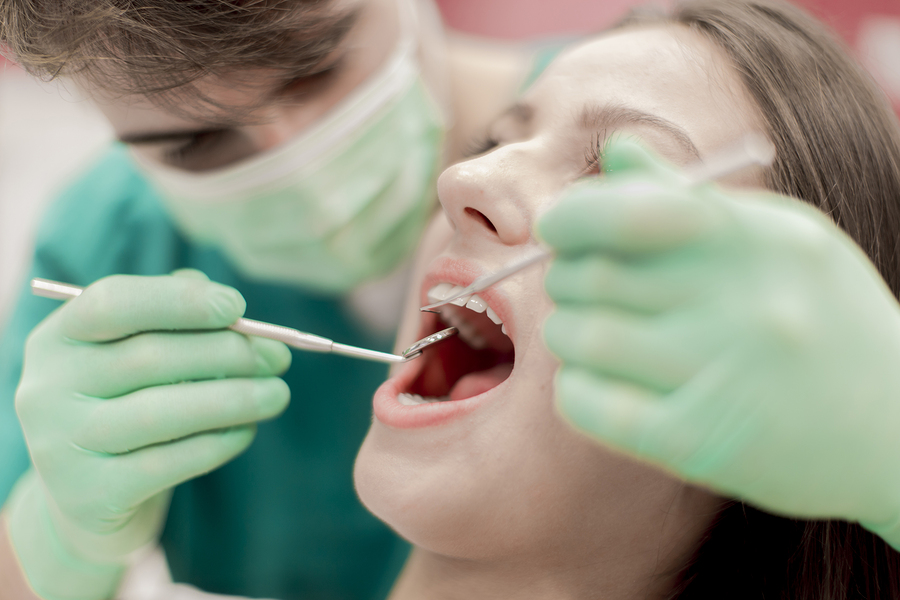
by Dr. Jacqueline S. Allen | Mar 30, 2015 | Blog, Dentistry, Endodontics, Sports
 As the spring training crowds populate the valley and amateur spring sports are beginning, Dr. Allen of Phoenix Endodontic Group has some wise words to help players avoid dental injuries.
As the spring training crowds populate the valley and amateur spring sports are beginning, Dr. Allen of Phoenix Endodontic Group has some wise words to help players avoid dental injuries.
The speed and velocity of a thrown or hit fastball is certainly impressive, and can be a major danger to your beautiful teeth. Imagine this projectile hurtling towards you at speeds over 100mph. Losing your focus for even a second could potentially result in significant damage to your teeth and mouth. Dr. Allen identifies the most common baseball dental injuries as Avulsed (knocked-out) teeth and fractures of the teeth, which are painful and avoidable.
The best method of preventing dental injuries is very simple. WEAR A MOUTHGUARD. This is basically the only way to protect the teeth during contact sports, Dr. Allen warns. These are found at any store that carries sporting goods and should be considered a mandatory part of your equipment as a baseball player.
Should you suffer a knocked out tooth, a few tips may improve your chances of saving the tooth. First, retrieve the tooth gently, grasping it only by the chewing surface and never the root. Once the tooth has been acquired, rinse it thoroughly with clean water. Do not scrub the tooth or clean it with anything other than a washed finger and clear water. Try to reinsert the tooth back into position if possible and keep it in place with your fingers or closed mouth. If you are not able to reinsert the tooth, store it in milk (or failing that, inside your cheek) and get to your Endodontist immediately. Do not let the tooth dry out or wrap it in napkins or cloth.
Dental injuries like cracked or fractured teeth should also be attended to as soon as possible to help avoid further deterioration of the tooth. Prompt attention generally results in a less complex repair process and better chances of saving the tooth.
Dental injuries are extremely preventable with a little precaution. Talk to Dr. Allen about protecting your teeth during baseball and similar sports. Should you suffer a dental emergency, the fantastic doctors and staff at Phoenix Endodontic Group will save the day!

by Dr. Jacqueline S. Allen | Dec 22, 2014 | Blog, Dentistry, Endodontics
 In the field of Endodontics, retreating root canals and other failed dental work can be a routine part of daily practice. There are a few frequently observed conditions that often require repeat work. Dr. Susan Wood of Phoenix Endodontic Group mentions some of these situations.
In the field of Endodontics, retreating root canals and other failed dental work can be a routine part of daily practice. There are a few frequently observed conditions that often require repeat work. Dr. Susan Wood of Phoenix Endodontic Group mentions some of these situations.
For some patients in Endodontics, they’ve undergone a root canal and failed to follow through with the entire treatment process. After your treatment has been completed at your Endodontist’s office, it is important to follow up with your general dentist for a permanent restoration or crown to prevent leakage. RCT that is done properly the first time by an Endodontist has over 95% success rate, providing that the tooth has been restored adequately in a timely manner, says Dr. Wood.
Another type of treatments that may eventually degrade are the seals on teeth that have been filled or received root canal therapy. Endodontics patients must be dedicated to their twice-yearly dental checkup for best results with seals. Dr. Wood describes the problem: Just like your automobile’s tires that wear after excessive use, seals on fillings can break down after months of chewing. It is important to see your general dentist regularly, to catch the breakdown in marginal sealing prior to them allowing leakage into the root canal space.
Last but not least in the list of retreatment cases are root canals that have failed due to ineffective treatment. This could be caused by failure to remove all of the infected tissue within the tooth, a compromised canal that was missed, or a filling that was not sealed properly. Should the tooth become problematic again, an Endodontics professional may repeat the root canal or extract the tooth.
For best results regarding your dental health and endodontics needs, see your dentist twice a year to identify problems early on. When a more complex issue arises, call Phoenix Endodontics Group for the best possible outcome!

by Dr. Jacqueline S. Allen | Dec 1, 2014 | Blog, Dentistry, Endodontics, Mission of Mercy
 The Central Arizona Dental Society Foundation (CADSF) is hosting its 3rd annual Dental Mission of Mercy event at the Veteran’s Memorial Coliseum at the Arizona State Fairgrounds Dec 12th-13th, bringing together hundreds of dental professionals who will provide free care to adults and children.
The Central Arizona Dental Society Foundation (CADSF) is hosting its 3rd annual Dental Mission of Mercy event at the Veteran’s Memorial Coliseum at the Arizona State Fairgrounds Dec 12th-13th, bringing together hundreds of dental professionals who will provide free care to adults and children.
The Coliseum floor will be transformed into a clinic with more than 100 portable dental units staffed by nearly 1,500 volunteer dentists, hygienists, lab technicians, assistants and lay people. Approximately $1.5 million in free care is expected to be delivered to over 2,000 patients on a first-come, first served basis during the two day period. Patients are advised to arrive early. Doors to the clinic will open at 6:00 am. Treatment will be performed both days from 6:00 am – 6:00 pm.
As in past years, the emphasis will be on relieving pain and infection. Dental services such as fillings, extractions, cleanings, as well as limited lab work will be provided to both adults and children of all ages. All patients will undergo a limited medical screening and those who have medically compromised conditions, such as extremely high blood pressure, uncontrolled diabetes or severe disabilities may not be able to be treated in this setting, and will be referred to other community resources.
Arizona residents suffer from higher rates of dental disease than many other states, and this is one way we can give back to the community while providing critical dental care to those who need it most, said Dr. Pat Rabot, a Phoenix Oral Surgeon and CADS Foundation Board President. We also hope to raise awareness about the increasing difficulties that low-income adults and children face in accessing necessary dental care. Arizona discontinued adult dental AHCCCS benefits in 2010 during the budget cuts of the great recession. The demand for care during this event proves how much the most vulnerable members of our community need this program to be restored.
A recent survey found that 21 percent of Arizona adults and 31 percent of all Arizona children have never had a dental check-up.
About CADS AZ Mission of Mercy: Originating in Virginia and spreading throughout the United States, more than 70 Mission of Mercy dental programs have been conducted since 2000 to provide free dental care to local residents who otherwise were unable to receive it. For more information on CADS AZ Mission of Mercy click here.

by Dr. Jacqueline S. Allen | Sep 15, 2014 | Blog, Dentistry, Endodontics
 Autumn in Arizona is a fantastic time of year for a sports-enthusiast, and a very busy time for Dr. Jacqueline S. Allen, your Phoenix Endodontist. As the weather cools down enough for outdoor activities, people forget to protect their teeth during play and suffer the consequences. Sports related dental injuries are easily avoidable. Here’s what you should know before this season.
Autumn in Arizona is a fantastic time of year for a sports-enthusiast, and a very busy time for Dr. Jacqueline S. Allen, your Phoenix Endodontist. As the weather cools down enough for outdoor activities, people forget to protect their teeth during play and suffer the consequences. Sports related dental injuries are easily avoidable. Here’s what you should know before this season.
The most common sports-related tooth injury seen in Dr. Allen’s office is gruesome. A blow to the front teeth by a body part like an elbow or knee, or from an object like a baseball or bat will often knock teeth loose, break or chip them, dislodge them completely. Dr. Allen also mentions that falling on your face is probably second, like skate boarding and eating concrete or a rail. Not only are these injuries incredibly painful but they can do permanent damage if not treated correctly.
To prevent most sports related dental injuries, Dr. Allen reminds you to wear a mouth guard. Mouth guards are effective in preventing injury, she says, and they are found in just about any discount store or sporting goods retailer. For a very inexpensive investment you can protect your teeth from serious damage.
If you suffer dental harm during a sporting activity your first action should be to get to Dr. Allen’s Phoenix Endodontist practice. Recover dislodged tooth or teeth if possible, picking them up by the chewing surface (never the root) and very gently rinsing it off with plain water. Do not use any chemicals or soaps or wrap it. If you can, gently place the rinsed tooth back in the tooth socket and keep it in place with your fingers or by softly clamping your teeth together. If you’re unable to do this, store the tooth in milk and seek emergency help right away. Your best chance of saving the tooth is with the help of a qualified Phoenix Endodontist such as Dr. Allen.
Fall sports injuries are very preventable, but should you experience one you must handle it quickly to save your smile. Dr. Allen and Phoenix Endodontic Group are here to help!

by Dr. Jacqueline S. Allen | Jul 21, 2014 | Blog, Business, Dentistry, Endodontics
 Over the years, marketing strategies for a dental office have changed. There are some many different variables which affect the type of marketing, how much you spend, how you target patients, etc. The focus of this article will be on marketing for dental specialists (Perio, Endo, Oral Surgery, Pedo & Ortho). Because we are now in the throes of another hot summer in Central Arizona, we will focus on what marketing efforts to focus on in the summer months.
Over the years, marketing strategies for a dental office have changed. There are some many different variables which affect the type of marketing, how much you spend, how you target patients, etc. The focus of this article will be on marketing for dental specialists (Perio, Endo, Oral Surgery, Pedo & Ortho). Because we are now in the throes of another hot summer in Central Arizona, we will focus on what marketing efforts to focus on in the summer months.
Phoenix Endodontic Group like many other dental specialists receive a significant portion of their patients from direct referrals from other dental offices and therefore the strategy all year round is to recognize which offices are sending you patients and which offices have the potential to do so. Staff should be aware and trained that every interaction with a referring office is an “opportunity” or “touch point.”
Some touch points are small, i.e a simple phone call to set up an appointment for the patient to go back to see the general dentist once treatment is completed. Some touch points are planned out as a Thank You to the office and a delivery of fresh baked goods for the staff to know how much their referrals mean to the specialist. These are marketing activities that should take place all year long, to keep all referring offices on the “radar screen” of the dental specialist.
In general terms, the flow of patients slows down in the Arizona summer. The snowbirds fly back to Minnesota, Iowa and the like and dentists with young families schedule summer activities with their families. Phoenix Endodontic Group has always found the 3rd quarter (summer) to be slower than the rest of the year. A good time to catch your breath, relax and slow down, right? Wrong! This should be the time of year when you go at the marketing as hard as you can.
If the third quarter is slower than others in a specialty dental office that means you will have staff with less tasks to do than normal. We say put them to work reaching out to your referral base. Everyone has different interpersonal skills. Send staff to meet and greet staff at your referral offices, that is a good way to spend any down time. Staff can also help produce marketing pieces and information to email to referring offices with something as simple as your summer hours or other important information.
We advocate using the summer to solidify your current relationships with offices that you might be taking for granted but are being wooed constantly by other specialty offices. Don’t let your office be a victim of “out of sight, out of mind.” A personal visit from your office to your top 20 referring offices during the summer months is a must.

by Dr. Jacqueline S. Allen | Jun 30, 2014 | Blog, Dentistry
 A dental emergency can happen to anyone, anytime. Dr. Jacqueline S. Allen of Phoenix Endodontic Group is a pro at handling these problems with an expert hand and offers the following information about cracked teeth.
A dental emergency can happen to anyone, anytime. Dr. Jacqueline S. Allen of Phoenix Endodontic Group is a pro at handling these problems with an expert hand and offers the following information about cracked teeth.
Cracked teeth can be categorized into four groups: Fractured cusp, cracked tooth, split tooth, and vertical root fracture. Though they may sound similar, they are decidedly different.
In the case of a fractured cusp, part of the tooth’s surface might be cracked off. This happens frequently with teeth that were previously filled. These are repaired using a crown, which is a cap cemented into place to hold your tooth firmly together.
A cracked tooth has developed a vertical crack from the surface to the gumline. At this point, the tooth is still intact and the inner pulp containing the vital nerves and root hasn’t been breached. This type of damage could be fixed with a filling or a crown.
If allowed to progress, a crack can become a split tooth, where the crack progresses below the gumline and the tooth may separate into pieces. This is the type of dental emergency needing more advanced treatment like root canal therapy.
Last but not least, a vertical root fracture is a crack that starts on the root end of the tooth rather than the chewing surface. Sometimes symptoms aren’t obvious, which is why it’s so important for regular dental checkups. This type of crack may require removing the tooth or part of the root.
Many of these cases can be avoided by using common sense. For dietary culprits of cracks, Ice and nuts are the big ones: nuts particularly–if you are biting the shell to get the meat out of them, says Dr. Allen. Avoid bad habits like “chewing on any object that is hard or repetitive.” Other problems may not be as controllable, Dr. Allen indicates. Grinding or clenching can also fracture teeth, particularly teeth that have large fillings with no crown. Teeth that have decay are prone to fracture as well.
For more information on a dental emergency like cracked teeth, call Dr. Allen at Phoenix Endodontic Group today!

 As the spring training crowds populate the valley and amateur spring sports are beginning, Dr. Allen of Phoenix Endodontic Group has some wise words to help players avoid dental injuries.
As the spring training crowds populate the valley and amateur spring sports are beginning, Dr. Allen of Phoenix Endodontic Group has some wise words to help players avoid dental injuries.









 A dental emergency can happen to anyone, anytime. Dr. Jacqueline S. Allen of
A dental emergency can happen to anyone, anytime. Dr. Jacqueline S. Allen of